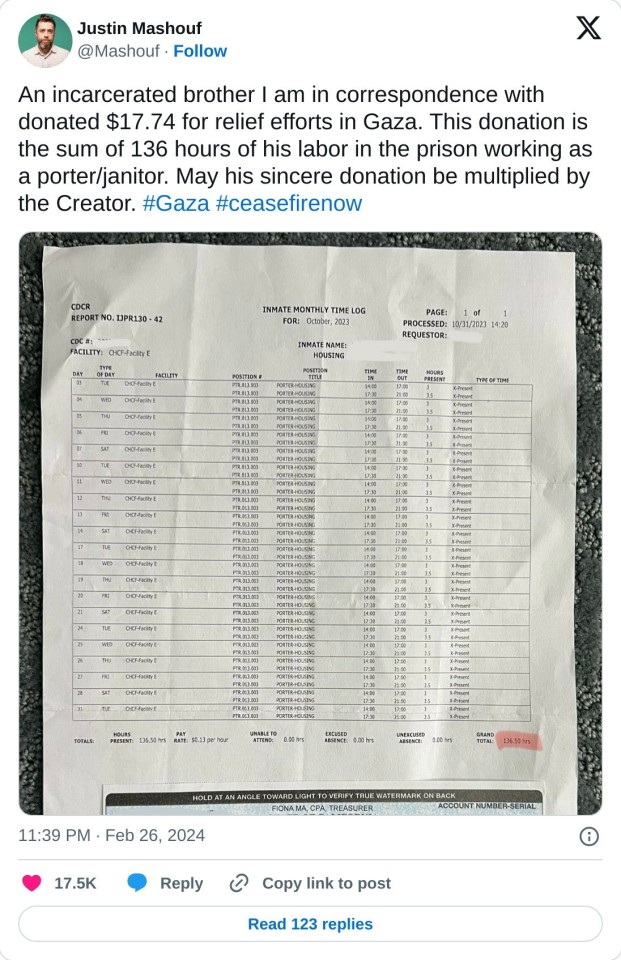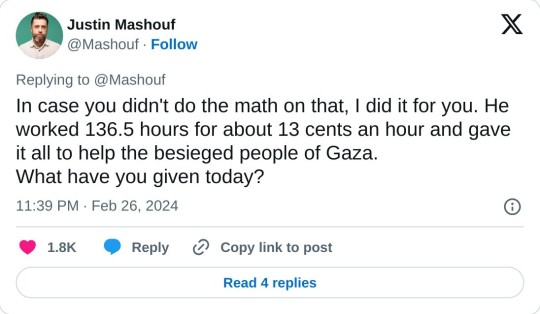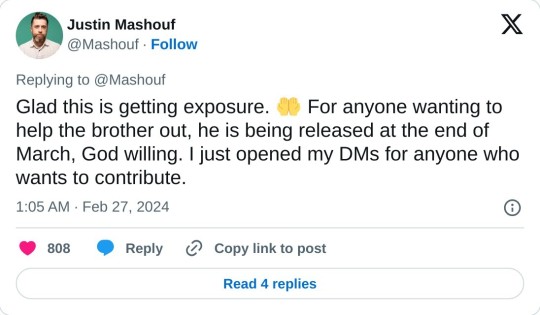#It's In Carcere
Explore tagged Tumblr posts
Text






Link to thread.
Link to article.
Link to author's bio.
Alt text enabled on all images.
#black lives matter#blm#civil liberties#civil rights#police abolition#abolition#defund the police#abolish the police#acab#all cops are bastards#copaganda#surveillance#police state#fascism#mass incarceration#carceral state#anti blackness#racism#police violence#us politics#fuck the usa#white liberals#dnc#barack obama#scratch a liberal and a fascist bleeds#political science#twitter#knee of huss
13K notes
·
View notes
Text
For non-USA-inauguration reasons (/sar) I'm just going to drop this list of anti-carceral mental health supports. (988 and other government-run resources are ultimately connected to the cops. This is a list of resources that will not report you /srs) Obviously, the bigger issues are things like housing, food, discrimination, etc, but if you need a life vest while we're still working on fixing the system, here they are.
~~~THRIVE Lifeline: text “THRIVE” to +1.313.662.8209 from anywhere, 24/7. Text-based support, by and for multiply marginalized people. ~~~Trans Lifeline: call 877.565.8860 in US or 877.330.6366 in Canada, Mon-Fri 10a-6p PT. Peer support and crisis hotline for trans people. ~~~BlackLine: call or text 1.800.604.5841 in US, Mon-Fri 6a-8p, Sat-Sun 5p-9p PT. Crisis support with a Black, LGBTQ+, and Black Femme lens, and a safe line to report police brutality. ~~~Wildflower Alliance Peer Support Line: call 888.407.4515 in the US, open 4-6p PT Mon-Thurs, and 4-7p PT Fri-Sun. Lived experience with psychiatric diagnosis, trauma, addiction, etc. ~~~Project LETS: text 401.400.2905, Mon-Sat 7a-1p PT for urgent support with psychiatric incarceration / involuntary hospitalization in the US. ~~~Don’t Call The Police: A database of local and national community-based alternatives to calling the police or 911 has been broken down by major US cities. https://thriv.life/DontCall
Please trust in the hundreds of thousands of people fighting for you right now. We love you. We are trying so hard to make a better world for you /gen
#social justice#sociology student#eat the rich#trans liberation#fat liberation#mad liberation#queer liberation#liberation#black liberation#youth liberation#trans rights#protect trans lives#trans lives matter#black lives matter#blm#us stuff#usa stuff#usa news#2025 inauguration#traitor trump#president trump#trump#usa politics#important#lgbtq+#lgbt rights#mytomatoes#anti carceral#hotline#warmline
2K notes
·
View notes
Text

Link to tweet
Link to article
2K notes
·
View notes
Text
We talk about prison "abolition" and not prison "reform" not because we believe it's possible to create a system where no incarceration is necessary. We say "abolition" because we want to create systems that allow the establishment of a new reparative justice structure, which uses incarceration as little as possible, and which is not a reform of the current incarceration structure, which does not repair or do justice. We do not believe the current structure can be reformed.
Reforming our current incarceration system into a justice system would be like reforming a dog fighting structure into a dog training structure. (And before anyone accuses me of comparing people in prison to dogs - no, I'm not, but I am saying that people who run prisons treat people like dogs.) Dog fighting structures were never designed to train dogs. The people that run them aren't qualified to train dogs for anything but violence (and are incentivized to continue training violence). The incarceration system creates violence and antisocial behavior. It is incentivized to continue doing so. It was never meant to repair social harm.
Prison abolition means, piece by piece, cutting off the supply of bodies to the incarceration structure.
When drug users get medical care instead of being criminalized, prisons are no longer needed to house drug users. When the mentally ill are given medical care instead of being criminalized, prisons are no longer needed to house the mentally ill. When homeless people are given housing instead of being criminalized, prisons are no longer needed to house the homeless. When impoverished people are given welfare and food benefits instead of being criminalized, prisons are no longer needed to house the poor. When youth are given opportunities outside of gangs, prisons have fewer gang members to house. We shrink the system, and we keep shrinking it. Next we create systems to reduce the population of domestic abusers. Next we tackle sexual assault. Every time it shrinks, we look at the remaining population and figure out what population we can tackle next.
That's how prison abolition works.
1K notes
·
View notes
Text
Y’know about notorious housing costs and homelessness situation in Seattle, Portland, San Francisco, Los Angeles, the Pacific coast of the US? In 2023, Portland and San Francisco are both moving forward with major multi-million-dollar projects to outlaw “street camping” while opening “city-run mass encampments.”

The mayor, 14 April 2023:

San Francisco is site of arguably one of worst situations in the US, where thousands units are completely inaccessible, and people pay over $2000 a month to live in closets or dorm-style high-density shared rooms, and upscale coffee shops and restaurants require phone apps or payment receipts for people to access restrooms. The W!!pedia page “Homelessness in the San Francisco Bay Area” is over 120,000 bytes in size and 12,000 words in length.
In April 2023, the city announces its grand plan: A “five-year plan” costing $600 million to “cut the number of unsheltered homeless in halve” in five years. So not a plan to put people in homes, but just to get them off the street, qualifying them as part of the strange designation of “the sheltered homeless” (they will still be homeless, but they won’t be “on the streets,” and will be “sheltered” by a city shelter or camp).
Get them out of sight, put them out of the way on an island or something:

In 2022, the city estimated that over 20,000 people are homeless in a calendar year.
And that’s only within the formal city limits of San Francisco and doesn’t include the rest of the Bay Area (which contains millions more people in Oakland, San Jose, Richmond, etc.)

The rest of the Pacific coast?
In late 2022, Portland, its mayor, and its city council announced a major initiative to ban and outlaw “street camping”. Portland will simultaneously by opening “city-run encampments” or “sanctioned mass homeless camps.” In early 2023, Portland begins this project:



March 2023:

Hmm.
One of the most popular homeless related questions on Q/uora, as if were a “valid question” about how “you must earn your existence through work”, and not a sickening disregard for life:

Hmm.
Like:

11K notes
·
View notes
Text
Amid all the ridiculous handwringing over how the public reacted to the shooting of the UHC CEO, this is one of the only reasonably grounded things I've read:
It is a rare thing for an American CEO or other public figure to be targeted in this manner. But the structure of feeling it unleashed did not seem novel to me. Americans have a great deal of recent experience assessing the worthiness of strangers for execution. It’s one of the things we do together online: when someone is killed by a cop or vigilante; when a protester is mowed down by a car; when a Palestinian child is killed by an Israeli sniper or an Israeli civilian by Hamas. Arguing about whose lives are expendable is one of America’s favorite pastimes.
What about our bloodlust? Should we be concerned that Americans have betrayed an appetite for political violence? Perhaps. But the flip side of appetite is metabolism: not what we want, but how we bear what we are given. Americans, we might say, have a prodigious capacity for metabolizing brutality and death — we have been conditioned for it. As the writer and gun-violence expert Patrick Blanchfield put it to me, “This event gives us something fairly rare: a situation where a person victimized by a distinctively American system of normalized human liquidation — i.e., gun homicide — is also representative of that other distinctively American institution for disposing of human life, our for-profit health-care system, a key function of which is determining how much individual human lives are worth, and enforcing those assessments with ruthlessly incentivized efficiency.” For Blanchfield, Thompson’s murder, and the system of mechanized cruelty from which he profited, are part of the same regime of “human disposability” — a system in which human life, instead of being precious and priceless, is “a fungible commodity like anything else.”
528 notes
·
View notes
Text
Prison-tech company bribed jails to ban in-person visits
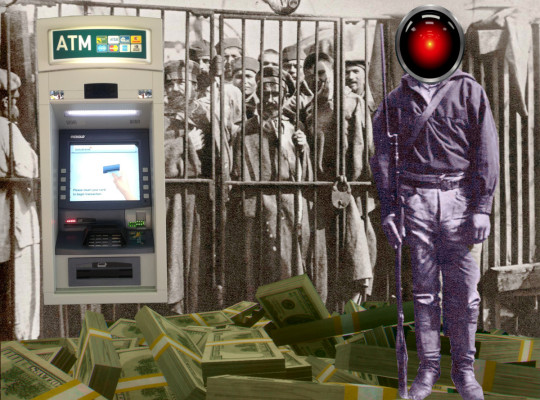
I'm on tour with my new, nationally bestselling novel The Bezzle! Catch me in BOSTON with Randall "XKCD" Munroe (Apr 11), then PROVIDENCE (Apr 12), and beyond!

Beware of geeks bearing gifts. When prison-tech companies started offering "free" tablets to America's vast army of prisoners, it set off alarm-bells for prison reform advocates – but not for the law-enforcement agencies that manage the great American carceral enterprise.
The pitch from these prison-tech companies was that they could cut the costs of locking people up while making jails and prisons safer. Hell, they'd even make life better for prisoners. And they'd do it for free!
These prison tablets would give every prisoner their own phone and their own video-conferencing terminal. They'd supply email, of course, and all the world's books, music, movies and games. Prisoners could maintain connections with the outside world, from family to continuing education. Sounds too good to be true, huh?
Here's the catch: all of these services are blisteringly expensive. Prisoners are accustomed to being gouged on phone calls – for years, prisons have done deals with private telcos that charge a fortune for prisoners' calls and split the take with prison administrators – but even by those standards, the calls you make on a tablet are still a ripoff.
Sure, there are some prisoners for whom money is no object – wealthy people who screwed up so bad they can't get bail and are stewing in a county lockup, along with the odd rich murderer or scammer serving a long bid. But most prisoners are poor. They start poor – the cops are more likely to arrest poor people than rich people, even for the same crime, and the poorer you are, the more likely you are to get convicted or be suckered into a plea bargain with a long sentence. State legislatures are easy to whip up into a froth about minimum sentences for shoplifters who steal $7 deodorant sticks, but they are wildly indifferent to the store owner's rampant wage-theft. Wage theft is by far the most costly form of property crime in America and it is almost entirely ignored:
https://www.theguardian.com/us-news/2023/jun/15/wage-theft-us-workers-employees
So America's prisons are heaving with its poorest citizens, and they're certainly not getting any richer while they're inside. While many prisoners hold jobs – prisoners produce $2b/year in goods and $9b/year in services – the average prison wage is $0.52/hour:
https://www.dollarsandsense.org/archives/2024/0324bowman.html
(In six states, prisoners get nothing; North Carolina law bans paying prisoners more than $1/day, the 13th Amendment to the US Constitution explicitly permits slavery – forced labor without pay – for prisoners.)
Likewise, prisoners' families are poor. They start poor – being poor is a strong correlate of being an American prisoner – and then one of their breadwinners is put behind bars, taking their income with them. The family savings go to paying a lawyer.
Prison-tech is a bet that these poor people, locked up and paid $1/day or less; or their families, deprived of an earner and in debt to a lawyer; will somehow come up with cash to pay $13 for a 20-minute phone call, $3 for an MP3, or double the Kindle price for an ebook.
How do you convince a prisoner earning $0.52/hour to spend $13 on a phone-call?
Well, for Securus and Viapath (AKA Global Tellink) – a pair of private equity backed prison monopolists who have swallowed nearly all their competitors – the answer was simple: they bribed prison officials to get rid of the prison phones.
Not just the phones, either: a pair of Michigan suits brought by the Civil Rights Corps accuse sheriffs and the state Department of Corrections of ending in-person visits in exchange for kickbacks from the money that prisoners' families would pay once the only way to reach their loved ones was over the "free" tablets:
https://arstechnica.com/tech-policy/2024/03/jails-banned-family-visits-to-make-more-money-on-video-calls-lawsuits-claim/
These two cases are just the tip of the iceberg; Civil Rights Corps says there are hundreds of jails and prisons where Securus and Viapath have struck similar corrupt bargains:
https://civilrightscorps.org/case/port-huron-michigan-right2hug/
And it's not just visits and calls. Prison-tech companies have convinced jails and prisons to eliminate mail and parcels. Letters to prisoners are scanned and delivered their tablets, at a price. Prisoners – and their loved ones – have to buy virtual "postage stamps" and pay one stamp per "page" of email. Scanned letters (say, hand-drawn birthday cards from your kids) cost several stamps:
https://pluralistic.net/2024/02/14/minnesota-nice/#shitty-technology-adoption-curve
Prisons and jails have also been convinced to eliminate their libraries and continuing education programs, and to get rid of TVs and recreational equipment. That way, prisoners will pay vastly inflated prices for streaming videos and DRM-locked music.
The icing on the cake? If the prison changes providers, all that data is wiped out – a prisoner serving decades of time will lose their music library, their kids' letters, the books they love. They can get some of that back – by working for $1/day – but the personal stuff? It's just gone.
Readers of my novels know all this. A prison-tech scam just like the one described in the Civil Rights Corps suits is at the center of my latest novel The Bezzle:
https://us.macmillan.com/books/9781250865878/thebezzle
Prison-tech has haunted me for years. At first, it was just the normal horror anyone with a shred of empathy would feel for prisoners and their families, captive customers for sadistic "businesses" that have figured out how to get the poorest, most desperate people in the country to make them billions. In the novel, I call prison-tech "a machine":
a million-armed robot whose every limb was tipped with a needle that sank itself into a different place on prisoners and their families and drew out a few more cc’s of blood.
But over time, that furious empathy gave way to dread. Prisoners are at the bottom of the shitty technology adoption curve. They endure the technological torments that haven't yet been sanded down on their bodies, normalized enough to impose them on people with a little more privilege and agency. I'm a long way up the curve from prisoners, but while the shitty technology curve may grind slow, it grinds fine:
https://pluralistic.net/2021/02/24/gwb-rumsfeld-monsters/#bossware
The future isn't here, it's just not evenly distributed. Prisoners are the ultimate early adopters of the technology that the richest, most powerful, most sadistic people in the country's corporate board-rooms would like to force us all to use.

If you'd like an essay-formatted version of this post to read or share, here's a link to it on pluralistic.net, my surveillance-free, ad-free, tracker-free blog:
https://pluralistic.net/2024/04/02/captive-customers/#guillotine-watch

Image: Cryteria (modified) https://commons.wikimedia.org/wiki/File:HAL9000.svg
CC BY 3.0 https://creativecommons.org/licenses/by/3.0/deed.en
--
Flying Logos https://commons.wikimedia.org/wiki/File:Over_$1,000,000_dollars_in_USD_$100_bill_stacks.png
CC BY-SA 4.0 https://creativecommons.org/licenses/by-sa/4.0/deed.en
--
KGBO https://commons.wikimedia.org/wiki/File:Suncorp_Bank_ATM.jpg
CC BY-SA 3.0 https://creativecommons.org/licenses/by-sa/3.0/deed.en
#pluralistic#prison#prison-tech#marty hench#the bezzle#securus#captive audiences#St Clair County#human rights#prisoners rights#viapath#gtl#global tellink#Genesee County#michigan#guillotine watch#carceral state#corruption
1K notes
·
View notes
Text
Legal protection against domestic violence has become widespread

"This chart shows the share of the global population living in countries that criminally sanction domestic violence or provide protection against it. The data comes from the World Bank’s Women, Business and the Law project.
Throughout the decades, the legislation on domestic violence has increased markedly. Until the 1990s, less than 1% of the global population in countries was legally protected from it, with only Canada, Sweden, and Ireland providing such safeguards. And as recently as 20 years ago, 80% of people lived in countries without legal penalties for domestic violence.
But by 2023, this had more than reversed, and 9 in 10 people lived in countries with legal measures to combat domestic violence. This shift highlights an increased recognition around the world that domestic violence is common, especially against women."
-via Our World in Data, September 19, 2024
--
Note: This really puts in perspective just how much and how quickly attitudes on domestic and gendered violence are changing. Look at that graph! Look at it!!
Thirty years ago, there was only a single country in the entire world that thought hitting your spouse should be a crime, and had acted on that. (It was Ireland, go Ireland.) That is a world of difference from where we are now.
#okay listen carceral feminism bad but I stand by this statistic as a huge sign of progress#carceral feminism = prison system as a key solution in feminism#women#womens rights#domestic violence#cw domestic violence#ipv#femicide#good news#hope#re: my tags obviously domestic violence happens to people of all genders#but it is still a major feminist issue for obvious reason and it is skewed in gender so I tagged correspondingly#abuse#cw abuse
645 notes
·
View notes
Text
Guys you need to understand that the intersection of citizenship, ICE detainment, and the prison industrial complex is not about deportation. It is about slavery and labor. When somebody is arrested by immigration agents they are not immediately put on a plane and sent home. They stay in an interment camp where they must wait for a hearing by an immigration judge. There are not many of these judges and so people WILL be waiting for months if not years in these facilities.
The government is, and has for the past quarter century, been constructing the framework it needs to enslave noncitizen residents in America and force them into the private prison industry where their labor can be sold to companies for base production tasks. The goal here is to provide a fallback for when American global trading hegemony ends (because it will) and we no longer have access to cheap foreign labor markets. We are manufacturing cheap labor markets domestically by arresting immigrants and toying with citizenship status.
What’s happening NOW and TODAY is just a piece in a process that has been ongoing for decades, under both Democrats and Republicans. This is not new, it’s just being marketed to the public differently now that an R is in charge so that the public can feel absolved of guilt.
The immediate goal of the Trump policies now are to overwhelm the immigration judiciary to accrue a stockpile of detained people lacking documentation. Once there are so many (we are here) the government will say “we can’t handle all of this! there aren’t enough judges!” But it will not supply more judges to actually deport these people. This stage is all about normalizing the presence of hundreds of thousands of detained immigrants under your nose.
The next step is allowing these facilities to more easily sell and exploit their labor. I forsee this administration using environmental crises to do so - look at the LA wildfires. They are often fought by incarcerated firefighters. We will see more of this as crises escalate - the government will begin using more carceral labor to deal with the aftermath of hurricanes, landslides, and wildfires. This will normalize carceral slavery in the eyes of the American public.
Once this step is accomplished it will be incredibly simple to further the normalization in moments where there is not an acute crises. Then, we will be having people in these camps making our textiles, picking and packaging our food, slaughtering cattle. After years of this you may even see carceral labor enter the service and entertainment industry. By 2035 you may even be able to call up CoreCivic and lease a cook or a maid! The hard working white woman needs household assistance, after all she is too busy girlbossing to do *those* things. Plus, it’s not her fault her slave decided to be a Criminal.
But it seems like most Americans are not conscious of this framework nor do they care. They engage with this from the perspective that “everyone is welcome here! don’t deport my friends!” hon your friends are not going to be deported, they are being enslaved. Begging you to use your fucking eyes. Your damn Senators are investing in GEO Group and CoreCivic for a reason! Because these companies have a great business plan! Enslaving immigrants already is a billion dollar industry and its potential for growth under post imperial late stage capitalism is mind-numbing!
#us politics#fuck america#socialism#communism#leftist#politics#death to america#2024 election#prison#prison industrial complex#carceral system#carceral labor#Angela Davis#ice raids#donald trump
314 notes
·
View notes
Text












sinner, you better get ready
#aura blackquill#simon blackquill#athena cykes#ace attorney#dual destinies#i know i should have looked up japanese funeral traditions for Metis but researching it made me sad. sorry >_<#Also I hope Aura's critique of masculinity comes thru- that its constructed to extract value from the working class & excuse state violence#it changes how I percieve Auras resentment of Athena- its almost less directed at her and more at the concept of innocence itself#that is: the binary of innocence & guilt which a foundational myth of the carceral state and simon wields against himself to save athena.#ANYWAY Aura have big tiddy and hate the system and that is why we simp#Also the subtitle is a linga ignotica lyric and a folk song
3K notes
·
View notes
Text
hey ! I have seen some folks spreading around links to suicide hotlines, and though I understand the sentiment, most of the hotlines I’ve seen linked around are active rescue hotlines.
for those who don’t know, a hotline doing “active rescue” is them calling the police on you if they think you’re a big enough danger to yourself. these hotlines are pretty exclusively focused on you making a safety plan or they call the cops, not anything else. (sometimes they will even call the cops on you after you’ve already made a safety plan)
please, if you’re going to spread around resources for suicidal people, consider spreading this list of non-carceral resources.
this has hotlines, warmlines, peer support, self help tools, and more. I can personally vouch for the THRIVE lifeline, though you do need to be 18 years or older to contact them.
#txt#suicide tw#I have. very strong feelings about the carceral nature of most hotlines#and how ineffective they can be
159 notes
·
View notes
Note
May I present the best headline I've seen today:

Look, the Fulton County people have already said they plan to give him the full works: fingerprinting, mugshot, perp walk, releasing height/weight, etc, all the usual criminal treatment that he's managed to avoid so far. So yeah, he's gonna fucking HATE it, and if I don't see the mugshot everywhere on everything and made into all the memes you can think of, the internet will have failed me.
#textsfromgravityfallsblog#ask#politics for ts#the giant orange monster#i don't approve of the carceral system etc etc but also if there is anyone who deserves the worst the american prison system has to offer#it's the fucking orange fuhrer#so yeah
1K notes
·
View notes
Text
front page news for years now, "the homelessness crisis", newspaper printing letters to the editor from homeowners fretting about the "freeloaders" and how "dirty" homeless people are, the city progressively worsening their cracking down with ordinances. biggest issue in the city. apartments $675 in 2015 though unchanged go for $1500 in 2024. few months ago, significant new ordinance further criminalizing visible homelessness and banning people from parks and trails. multiple "community groups" now that hold events and pool money for advocacy, except they're not raising money to help poor people, they're raising money to pay for ads and banners and posters to say "keep them out of our neighborhood". imagine: in their free time, they go out of their way to attend potlucks, to get together, to talk about how much they don't like homeless people. it's that much of a priority in their lives. the place is reputed as by far "the most progressive city in the region". huge "enlightened (white) liberal" identity thing. many nonprofits.
this week, biking to work through middle class single-family neighborhood full of municipal employees. recoil and frown when i see the first yard sign: "no camping in parks! protect our children! protect our neighborhood!" but encounter more. many more. practically every other yard has the sign. these are administrators, plumbers, public school teachers, receptionists. people you interact with on a daily basis, who often have power over your well-being, who you hope would have your back, and these are the feelings and beliefs they are harboring.
very next morning. the big front page newspaper headline was the city announcing new contract, massive budget and payment to "private security force" to supervise several neighborhoods. giving them the power to issue warnings under city's new ordinances. (this is not the first year the city has paid mercenaries either. they've been doing it for about 5 years. they stand on street corners, tackle and remove "uncooperative" people from shelter vicinity, flaunting armor and weapons, glaring at passersby.) newspaper explains that someone on city council did try to add an amendment. they proposed that maybe the private security force (1) should not carry firearms, and (2) should at least wear body cameras if they were going to be a private company, interacting with the public, with the legal power to issue warnings. but nope. amendment rejected by 7 of the 9 councilors. the private contractors will carry guns and will not wear body cameras.
"most progressive city in the region" full of nonprofit careerists and liberal civil servant types cannot afford to put beds in shelters. cannot afford better social services. but they can apparently afford to pay massive sums to armed mercenaries. they will act with haste to introduce criminalizing ordinances. they will go out of their way even in their free time to rally and shout about keeping "dirty" people away from "our parks!"
345 notes
·
View notes
Text










Here's my discworld folder for music sheets. À la - what I did during my summer singing camp at the and of August. But hey it did wake up my artistic soul, even though not the type it was arming at xD.
#great a'tuin#the night watch#reginald shoe#john “mossy” lawn#agony aunts#rosemary palm#sandra battye#roberta meserole#havelock vetinari#nobby nobbs#cmot dibbler#lu-tze#carcer dun#john keel#(not really but technically)#sam vimes#fred colon#discworld death#granny weatherwax#the guarding dark#the summoning dark#tonker#lofty#eskarina smith#tiffany aching#susan sto helit#discworld#gnu terry pratchett#my art#fanart
206 notes
·
View notes
Text
FCC strikes a blow against prison profiteering
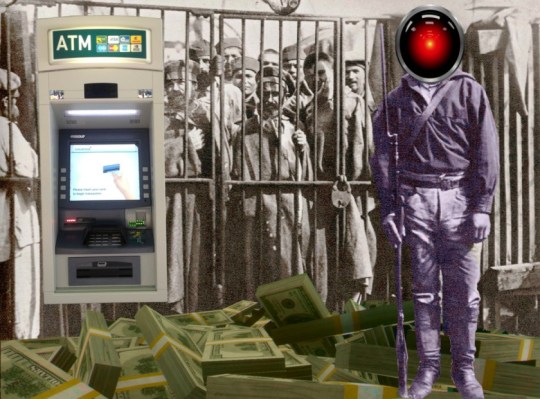
TOMORROW NIGHT (July 20), I'm appearing in CHICAGO at Exile in Bookville.

Here's a tip for policymakers hoping to improve the lives of the most Americans with the least effort: help prisoners.
After all, America is the most prolific imprisoner of its own people of any country in world history. We lock up more people than Stalin, than Mao, more than Botha, de Klerk or any other Apartheid-era South African president. And it's not just America's vast army of the incarcerated who are afflicted by our passion for imprisonment: their families and friends suffer, too.
That familial suffering isn't merely the constant pain of life without a loved one, either. America's prison profiteers treat prisoners' families as ATMs who can be made to pay and pay and pay.
This may seem like a losing strategy. After all, prison sentences are strongly correlated with poverty, and even if your family wasn't desperate before the state kidnapped one of its number and locked them behind bars, that loved one's legal defense and the loss of their income is a reliable predictor of downward social mobility.
Decent people don't view poor people as a source of riches. But for a certain kind of depraved sadist, the poor are an irresistible target. Sure, poor people don't have much money, but what they lack even more is protection under the law ("conservativism consists of the principle that there is an in-group whom the law protects but does not bind, and an out-group whom the law binds but does not protect" -Wilhoit). You can enjoy total impunity as you torment poor people, make them so miserable and afraid for their lives and safety that they will find some money, somewhere, and give it to you.
Mexican cartels understand this. They do a brisk trade in kidnapping asylum seekers whom the US has illegally forced to wait in Mexico to have their claims processed. The families of refugees – either in their home countries or in the USA – are typically badly off but they understand that Mexico will not lift a finger to protect a kidnapped refugee, and so when the kidnappers threaten the most grisly tortures as a means of extracting ransom, those desperate family members do whatever it takes to scrape up the blood-money.
What's more, the families of asylum seekers are not much better off than their kidnapped loved ones when it comes to seeking official protection. Family members who stayed behind in human rights hellholes like Bukele's El Salvador can't get their government to lodge official complaints with the Mexican ambassador, and family members who made it to the USA are in no position to get their Congressjerk to intercede with ICE or the Mexican consulate. This gives Mexico's crime syndicates total latitude to kidnap, torture, and grow rich by targeting the poorest, most desperate people in the world.
The private contractors that supply services to America's prisons are basically Mexican refugee-kidnappers with pretensions and shares listed on the NYSE. After decades of consolidation, the prison contracting sector has shrunk to two gigantic companies: Securus and Viapath (formerly Global Tellink). These private-equity backed behemoths dominate their sector, and have diversified, providing all kinds of services, from prison cafeteria meals to commissary, the prison stores where prisoners can buy food and other items.
If you're following closely, this is one of those places where the hair on the back of your neck starts to rise. These companies make money when prisoners buy food from the commissary, and they're also in charge of the quality of the food in the mess hall. If the food in the mess hall is adequate and nutritious, there's no reason to buy food from the commissary.
This is what economists call a "moral hazard." You can think of it as the reason that prison ramen costs 300% more than ramen in the free world:
https://pluralistic.net/2024/04/20/captive-market/#locked-in
(Not just ramen: in America's sweltering prisons, an 8" fan costs $40, and the price of water went up in Texas prisons by 50% during last summer's heatwave.)
It's actually worse than that: if you get sick from eating bad prison food, the same company that poisoned you gets paid to operate the infirmary where you're treated:
https://theappeal.org/massachusetts-prisons-wellpath-dentures-teeth/
Now, the scam of abusing prisoners to extract desperate pennies from their families is hardly new. There's written records of this stretching back to the middle ages. Nor is this pattern a unique one: making an unavoidable situation as miserable as possible and then upcharging people who have the ability to pay to get free of the torture is basically how the airlines work. Making coach as miserable as possible isn't merely about shaving pennies by shaving inches off your legroom: it's a way to "incentivize" anyone who can afford it to pay for an upgrade to business-class. The worse coach is, the more people you can convince to dip into their savings or fight with their boss to move classes. The torments visited upon everyone else in coach are economically valuable to the airlines: their groans and miseries translate directly into windfall profits, by convincing better-off passengers to pay not to have the same thing done to them.
Of course, with rare exceptions (flying to get an organ transplant, say) plane tickets are typically discretionary. Housing, on the other hand, is a human right and a prerequisite for human thriving. The worse things are for tenants, the more debt and privation people will endure to become home-owners, so it follows that making renters worse off makes homeowners richer:
https://pluralistic.net/2021/06/06/the-rents-too-damned-high/
For Securus and Viapath, the path to profitability is to lobby for mandatory, long prison sentences and then make things inside the prison as miserable as possible. Any prisoner whose family can find the funds can escape the worst of it, and all the prisoners who can't afford it serve the economically important function of showing the prisoners whose families can afford it how bad things will be if they don't pay.
If you're thinking that prisoners might pay Securus, Viapath and their competitors out of their own prison earnings, forget it. These companies have decided that the can make more by pocketing the difference between the vast sums paid by third parties for prisoners' labor and the pennies the prisoners get from their work. Remember, the 13th Amendment specifically allows for the enslavement of incarcerated people! Six states ban paying prisoners at all. North Carolina caps prisoners' wages at one dollar per day. The national average prison wage is $0.52/hour. Prisoners' labor produces $11b/year in goods and services:
https://www.dollarsandsense.org/archives/2024/0324bowman.html
Forced labor and extortion are a long and dishonorable tradition in incarceration, but this century saw the introduction of a novel, exciting way of extracting wealth from prisoners and their families. It started when private telcos took over prison telephones and raised the price of a prison phone call. These phone companies found willing collaborators in local jail and prison systems: all they had to do was offer to split the take with the jailers.
With the advent of the internet, things got far worse. Digitalization meant that prisons could replace the library, adult educations, commissary accounts, letter-mail, parcels, in-person visits and phone calls with a single tablet. These cheaply made tablets were offered for free to prisoners, who lost access to everything from their kids' handmade birthday cards to in-person visits with those kids.
In their place, prisoners' families had to pay huge premiums to have their letters scanned so that prisoners could pay (again) to view those scans on their tablets. Instead of in-person visits, prisoners families had to pay $3-10/minute for a janky, postage-stamp sized video. Perversely, jails and prisons replaced their in-person visitation rooms with rooms filled with shitty tablets where family members could sit and videoconference with their incarcerated loved ones who were just a few feet away:
https://pluralistic.net/2024/02/14/minnesota-nice/#shitty-technology-adoption-curve
Capitalists hate capitalism. The capital classes are on a relentless search for markets with captive customers and no competitors. The prison-tech industry was catnip for private equity funds, who bought and "rolled" up prison contractors, concentrating the sector into a duopoly of debt-laden companies whose ability to pay off their leveraged buyouts was contingent on their ability to terrorize prisoners' families into paying for their overpriced, low-quality products and services.
One particularly awful consequence of these rollups was the way that prisoners could lose access to their data when their prison's service-provider was merged with a rival. When that happened, the IT systems would be consolidated, with the frequent outcome that all prisoners' data was lost. Imagine working for two weeks to pay for a song or a book, or a scan of your child's handmade Father's Day card, only to have the file deleted in an IT merger. Now imagine that you're stuck inside for another 20 years.
This is a subject I've followed off and on for years. It's such a perfect bit of end-stage capitalist cruelty, combining mass incarceration with monopolies. Even if you're not imprisoned, this story is haunting, because on the one hand, America keeps thinking of new reasons to put more people behind bars, and on the other hand, every technological nightmare we dream up for prisoners eventually works its way out to the rest of us in a process I call the "shitty technology adoption curve." As William Gibson says, "The future is here, it's just not evenly distributed" – but the future sure pools up thick and dystopian around America's prisoners:
https://pluralistic.net/2021/02/24/gwb-rumsfeld-monsters/#bossware
My background interest in the subject got sharper a few years ago when I started working on The Bezzle, my 2023 high-tech crime thriller about prison-tech grifters:
https://us.macmillan.com/books/9781250865878/thebezzle
One of the things that was on my mind when I got to work on that book was the 2017 court-case that killed the FCC's rules limit interstate prison-call gouging. The FCC could have won that case, but Trump's FCC chairman, Ajit Pai, dropped it:
https://arstechnica.com/tech-policy/2017/06/prisoners-lose-again-as-court-wipes-out-inmate-calling-price-caps/
With that bad precedent on the books, the only hope prisoners had for relief from the FCC was for Congress to enact legislation specifically granting the agency the power to regulate prison telephony. Incredibly, Congress did just that, with Biden signing the "Martha Wright-Reed Just and Reasonable Communications Act" in early 2023:
https://www.congress.gov/bill/117th-congress/senate-bill/1541/text
With the new law in place, it fell to the FCC use those newfound powers. Compared to agencies like the FTC and the NLRB, Biden's FCC has been relatively weak, thanks in large part to the Biden administration's refusal to defend its FCC nomination for Gigi Sohn, a brilliant and accomplished telecoms expert. You can tell that Sohn would have been a brilliant FCC commissioner because of the way that America's telco monopolists and their allies in the senate (mostly Republicans, but some Democrats, too) went on an all-out offensive against her, using the fact that she is gay to smear her and ultimately defeat her nomination:
https://pluralistic.net/2023/03/19/culture-war-bullshit-stole-your-broadband/
But even without Sohn, the FCC has managed to do something genuinely great for America's army of the imprisoned. This week, the FCC voted in price-caps on prison calls, so that call rates will drop from $11.35 for 15 minutes to just $0.90. Both interstate and intrastate calls will be capped at $0.06-0.12/minute, with a phased rollout starting in January:
https://arstechnica.com/tech-policy/2024/07/fcc-closes-final-loopholes-that-keep-prison-phone-prices-exorbitantly-high/
It's hard to imagine a policy that will get more bang for a regulator's buck than this one. Not only does this represent a huge savings for prisoners and their families, those savings are even larger in proportion to their desperate, meager finances.
It shows you how important a competent, qualified regulator is. When it comes to political differences between Republicans and Democrats, regulatory competence is a grossly underrated trait. Trump's FCC Chair Ajit Pai handed out tens of billions of dollars in public money to monopoly carriers to improve telephone networks in underserved areas, but did so without first making accurate maps to tell him where the carriers should invest. As a result, that money was devoured by executive bonuses and publicly financed dividends and millions of Americans entered the pandemic lockdowns with broadband that couldn't support work-from-home or Zoom school. When Biden's FCC chair Jessica Rosenworcel took over, one of her first official acts was to commission a national study and survey of broadband quality. Republicans howled in outrage:
https://pluralistic.net/2023/11/10/digital-redlining/#stop-confusing-the-issue-with-relevant-facts
The telecoms sector has been a rent-seeking, monopolizing monster since the days of Samuel Morse:
https://pluralistic.net/2024/07/18/the-bell-system/#were-the-phone-company-we-dont-have-to-care
Combine telecoms and prisons, and you get a kind of supermonster, the meth-gator of American neofeudalism:
https://www.nbcnews.com/news/us-news/tennessee-police-warn-locals-not-flush-drugs-fear-meth-gators-n1030291
The sector is dirty beyond words, and it corrupts everything it touches – bribing prison officials to throw out all the books in the prison library and replace them with DRM-locked, high-priced ebooks that prisoners must toil for weeks to afford, and that vanish from their devices whenever a prison-tech company merges with a rival:
https://pluralistic.net/2024/04/02/captive-customers/#guillotine-watch
The Biden presidency has been fatally marred by the president's avid support of genocide, and nothing will change that. But for millions of Americans, the Biden administration's policies on telecoms, monopoly, and corporate crime have been a source of profound, lasting improvements.
It's not just presidents who can make this difference. Millions of America's prisoners are rotting in state and county jails, and as California has shown, state governments have broad latitude to kick out prison profiteers:
https://pluralistic.net/2023/05/08/captive-audience/#good-at-their-jobs

Support me this summer on the Clarion Write-A-Thon and help raise money for the Clarion Science Fiction and Fantasy Writers' Workshop!

If you'd like an essay-formatted version of this post to read or share, here's a link to it on pluralistic.net, my surveillance-free, ad-free, tracker-free blog:
https://pluralistic.net/2024/07/19/martha-wright-reed/#capitalists-hate-capitalism

Image: Cryteria (modified) https://commons.wikimedia.org/wiki/File:HAL9000.svg
CC BY 3.0 https://creativecommons.org/licenses/by/3.0/deed.en
--
Flying Logos (modified) https://commons.wikimedia.org/wiki/File:Over_$1,000,000_dollars_in_USD_$100_bill_stacks.png
CC BY-SA 4.0 https://creativecommons.org/licenses/by-sa/4.0/deed.en
--
kgbo (modified) https://commons.wikimedia.org/wiki/File:Suncorp_Bank_ATM.jpg
CC BY-SA 3.0 https://creativecommons.org/licenses/by-sa/3.0/deed.en
#pluralistic#prison tech#fcc#martin hench#marty hench#the bezzle#captive audiences#carceral state#worth rises#bezzles#Martha Wright-Reed Just and Reasonable Communications Act#capitalists hate capitalism#shitty technology adoption curve
348 notes
·
View notes
